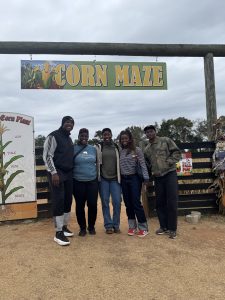 My family and I recently spent the day at Southern Belle Farm in McDonough, Georgia—and it was absolutely amazing. Acres upon acres of open land, a stadium for pig races, long lines of cars stretching in from every direction and the smell of good country food filling the air. The kind of place that slows you down just enough to remember what matters.
My family and I recently spent the day at Southern Belle Farm in McDonough, Georgia—and it was absolutely amazing. Acres upon acres of open land, a stadium for pig races, long lines of cars stretching in from every direction and the smell of good country food filling the air. The kind of place that slows you down just enough to remember what matters.
Southern Belle Farm has strawberries, blueberries, wildflowers and pumpkins—each with its own season and story. You can feel the intentionality of growth everywhere you walk. There’s a small country store that sells preserves, jellies and syrups—all made from what they grow. That’s always my first stop, but what I enjoy most is the corn maze.
From Fall to Harvest
Today, we call this season fall, but once upon a time, it was called harvest. The word “fall” didn’t come into common use until around the 16th Century, mostly in England and later America, as a way of describing the “falling” of leaves. But before that, it was “harvest”— a time that symbolized gathering the rewards of what had been sown.
That older word carries a depth that speaks to both farming and faith—and it’s a rhythm I see every year in my work with hitters.
The Four Seasons of Player Development
For me, August through October is fall—or better yet, harvest prep. That’s when my hitters are being assessed. We’re trying new things to see what works and what doesn’t. We’re identifying the weeds that could choke development.
Then November through January becomes winter. We build habits and strength—physically, mentally and spiritually. This is where identity and work ethic are strengthened through repetition.
February through April is spring. It’s when those habits convert into skills and skills pay bills.
And finally, May through July—that’s the real harvest. It’s the season of application, where everything that’s been cultivated finally produces fruit.
At Southern Belle Farm, strawberries are being planted now so they can be picked in the summer during their “You Pick It” season. Growth takes time, care and intentionality—and the same is true for young players and coaches.
The Corn Maze and the Maze of Travel Baseball
As my wife Kelli and I entered the corn maze, we had two choices: the short route or the long one. I was tired, so we chose the short one. But what struck me most was how confusing it can be to navigate when you’re on the ground.
From above, the maze makes sense—you can see the patterns, the paths and even the dead ends. But from the ground, it’s easy to get lost.
That’s the reality of travel baseball—and life. It’s convoluted, complicated, and crowded. There are short routes and long ones, but when you’re in the maze, everything looks the same. That’s where the role of a coach becomes critical.
A great coach has an overhead view. They see what you can’t. They can tell you when to go straight, when to turn right, and when to stop. They help you navigate the maze.
The Role of a Coach: From Home to Home
Home to First – Conviction:
A good coach starts with helping a player understand why they’re playing. It’s not about social media likes or tournament trophies—it’s about conviction. Purpose fuels performance.
First to Second – Clarity:
Once conviction is established, clarity follows. The coach guides players toward specific, measurable goals—a target worth running toward.
Second to Third – Consistency:
This is where most players struggle. Progress isn’t linear. The role of the coach is to help athletes stay consistent through confusion—to trust the process even when results lag behind.
Third to Home – Celebration:
When growth finally turns into performance, a good coach reminds players to celebrate correctly—not just by winning games, but by becoming better people. Because in baseball and life, crossing home plate should always bring you back to where you started—grounded in gratitude.
The 9 Batters: Navigating the Maze of Travel Baseball
- Conviction – Know why you play. Purpose must come before performance.
- Commitment – Show up even when it’s inconvenient.
- Coachability – Be teachable. The maze changes, and you must adapt.
- Character – Who you are when no one’s watching determines where you’ll end up.
- Competence – Develop the skills to execute. Habits must translate to mastery.
- Connection – Build relationships that keep you accountable.
- Confidence – Believe in what you’ve been taught and in who you’re becoming.
- Composure – Pressure will test you; poise will protect you.
- Completion – Finish what you start. Harvest doesn’t come without endurance.
Lessons from the Farm
The farm reminded me that growth isn’t glamorous, but it’s always good. The soil doesn’t rush. The crops don’t compare themselves to one another. They just grow—season by season, harvest by harvest.
Southern Belle Farm is more than a family destination. For me, it’s a living classroom — one that teaches patience, persistence and perspective.
Whether you’re walking through a corn maze or coaching through the maze of youth baseball, remember this:
- You can’t see the path clearly from the ground. That’s why conviction, clarity, consistency and coaching matter.
- When you plant with purpose, protect your process and persevere through confusion—you’ll always find your way home.
Remember: Intelligence tops being smart.
For more information, visit www.diamonddirectors.com today.
If you found this inspiring and thought-provoking, or if you have any questions, comments or concerns, add me on Discord and let’s go deeper.
C.J. Stewart has built a reputation as one of the leading professional hitting instructors in the country. He is a former professional baseball player in the Chicago Cubs organization and has also served as an associate scout for the Cincinnati Reds. As founder and CEO of Diamond Directors Player Development, C.J. has more than 22 years of player development experience and has built an impressive list of clients, including some of the top young prospects in baseball today. If your desire is to change your game for the better, C.J. Stewart has a proven system of development and a track record of success that can work for you.

Leave a Reply